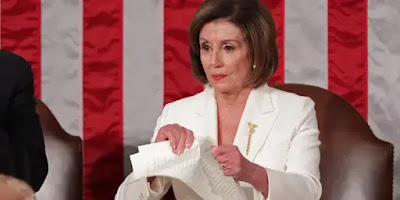Yesterday, Alex Moe of NBC News asked Nancy Pelosi, "Will you be okay if Bernie Sanders is the nominee?" Pelosi said "Yes."
Then Moe asked, "Do you have any concerns that you could lose the majority?" Pelosi said "No."
Sanders' supporters often fear that the Democratic establishment will stop him from winning the nomination. Establishment Democrats often try to stop him by expressing grave predictions about what will happen downticket. But Pelosi is the center of the establishment, and she's refusing to do that.
As far as I can tell, Pelosi and Sanders have basically the same goals. It doesn't look like that because they act in fundamentally different ways. Sanders expresses ideals; Pelosi makes deals. But achieving their goals takes both kinds, as well as a number of Elizabeth Warren figures in between.
Sanders stands on the fringes of the system, where he can express his ideals with utter clarity. He's a powerful voice for humane views on all sorts of domestic and foreign issues. He wields less official power, because taking power constrains your ability to act so as to express ideals. But ideals attract followers, and a movement formed around him.
Between ideals and deals are plans -- how to set up universal child care; how to pass Medicare for All. That's the level where a President mostly has to operate in today's media environment and legislative landscape. Warren excels there, which is why I voted for her.
Pelosi is a central node in the system. Every deal belongs to her, and she to it. That includes good deals and evil ones; honest compromises and corrupt bargains. Playing her role in the system requires respecting all her deals, which deeply constrains what positions she can take. But it also means that when she moves left, that's the system moving left.
Then Moe asked, "Do you have any concerns that you could lose the majority?" Pelosi said "No."
Sanders' supporters often fear that the Democratic establishment will stop him from winning the nomination. Establishment Democrats often try to stop him by expressing grave predictions about what will happen downticket. But Pelosi is the center of the establishment, and she's refusing to do that.
As far as I can tell, Pelosi and Sanders have basically the same goals. It doesn't look like that because they act in fundamentally different ways. Sanders expresses ideals; Pelosi makes deals. But achieving their goals takes both kinds, as well as a number of Elizabeth Warren figures in between.
Sanders stands on the fringes of the system, where he can express his ideals with utter clarity. He's a powerful voice for humane views on all sorts of domestic and foreign issues. He wields less official power, because taking power constrains your ability to act so as to express ideals. But ideals attract followers, and a movement formed around him.
Between ideals and deals are plans -- how to set up universal child care; how to pass Medicare for All. That's the level where a President mostly has to operate in today's media environment and legislative landscape. Warren excels there, which is why I voted for her.
Pelosi is a central node in the system. Every deal belongs to her, and she to it. That includes good deals and evil ones; honest compromises and corrupt bargains. Playing her role in the system requires respecting all her deals, which deeply constrains what positions she can take. But it also means that when she moves left, that's the system moving left.





